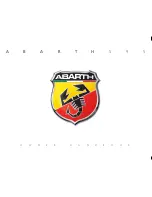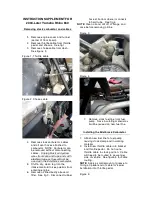
Tire Inflation Pressures
The proper cold tire inflation pressure is listed
on the driver’s side B-Pillar or rear edge of the
driver’s side door.
At least once a month:
•
Check and adjust tire pressure with a good
quality pocket-type pressure gauge. Do not
make a visual judgement when determining
proper inflation. Tires may look properly in-
flated even when they are under-inflated.
•
Inspect tires for signs of tire wear or visible
damage.
CAUTION!
After inspecting or adjusting the tire pres-
sure, always reinstall the valve stem cap.
This will prevent moisture and dirt from en-
tering the valve stem, which could damage
the valve stem.
Inflation pressures specified on the placard are
always “cold tire inflation pressure”. Cold tire
inflation pressure is defined as the tire pressure
after the vehicle has not been driven for at least
three hours, or driven less than 1 mile (1.6 km)
after sitting for a minimum of three hours. The
cold tire inflation pressure must not exceed the
maximum inflation pressure molded into the tire
sidewall.
Check tire pressures more often if subject to a
wide range of outdoor temperatures, as tire
pressures vary with temperature changes.
Tire pressures change by approximately 1 psi (7
kPa) per 12°F (7°C) of air temperature change.
Keep this in mind when checking tire pressure
inside a garage, especially in the Winter.
Example: If garage temperature = 68°F (20°C)
and the outside temperature = 32°F (0°C) then
the cold tire inflation pressure should be in-
creased by 3 psi (21 kPa), which equals 1 psi (7
kPa) for every 12°F (7°C) for this outside tem-
perature condition.
Tire pressure may increase from 2 to 6 psi (13
to 40 kPa) during operation. DO NOT reduce
this normal pressure build up or your tire pres-
sure will be too low.
Tire Pressures For High Speed
Operation
The manufacturer advocates driving at safe
speeds and within posted speed limits. Where
speed limits or conditions are such that the
vehicle can be driven at high speeds, maintain-
ing correct tire inflation pressure is very impor-
tant. Increased tire pressure and reduced ve-
hicle loading may be required for high-speed
vehicle operation. Refer to your authorized tire
dealer or original equipment vehicle dealer for
recommended safe operating speeds, loading
and cold tire inflation pressures.
WARNING!
High speed driving with your vehicle under
maximum load is dangerous. The added
strain on your tires could cause them to fail.
You could have a serious collision. Do not
drive a vehicle loaded to the maximum ca-
pacity at continuous speeds above 75 mph
(120 km/h).
244
Summary of Contents for 2016 Challenger
Page 2: ......
Page 3: ......
Page 5: ...2 ...
Page 9: ...6 ...
Page 11: ...8 ...
Page 63: ...60 ...
Page 126: ...INSTRUMENT CLUSTER BASE Instrument Cluster For 3 6L or 5 7L 123 ...
Page 128: ...INSTRUMENT CLUSTER PREMIUM Instrument Cluster For 6 4L 125 ...
Page 198: ...Control Setting Suggestions For Various Weather Conditions 195 ...
Page 245: ...242 ...
Page 342: ...8 MAINTENANCE SCHEDULES MAINTENANCE SCHEDULE 340 339 ...
Page 343: ...MAINTENANCE SCHEDULE Refer to the Service And Warranty Handbook for maintenance schedules 340 ...
Page 344: ...9 IF YOU NEED CONSUMER ASSISTANCE IF YOU NEED ASSISTANCE 342 341 ...
Page 346: ...343 ...
Page 347: ...344 ...
Page 348: ...10 INDEX 345 ...
Page 359: ...٨٧ ا وز و وي ٧٩ إ ٧٩ م Á ٧٩ J K ٣٧٦ ...
Page 372: ...١٠ س ا ٣٦٣ ...
Page 373: ...٣٦٢ ...
Page 374: ...٣٦١ ...
Page 376: ...٩ 9 ا ة A إ C 0 ا إذا ٣٦٠ ة ا A إ C 0 ا إذا ٣٥٩ ...
Page 377: ... ا ول اول ف 6 ن 4 وا ا د را ا ٣٥٨ ...
Page 378: ...٨ ا اول ٣٥٨ ا ول ٣٥٧ ...
Page 379: ...٣٥٦ ...
Page 476: ...٢٥٩ ...
Page 527: ... 9 J ا ا ال 0m ا 7 ا اد إ ت 0 ا ا ٢٠٨ ...
Page 602: ... ز س ا ة أ ات 6 4 ك k ودة ا ز 5 ُ 9 س ا ة أ ١٣٣ ...
Page 604: ...7 أ س ا ة أ ات 5 7 أو ات 3 6 آ ت k ودة ا ز 5 ُ 9 س ا ة أ ١٣١ ...
Page 727: ...٨ ...
Page 729: ...٦ ...
Page 732: ...١ ٤ ٤ ه F0G ٥ ا ا H ه ام J ا آ ٧ ت L و ات H ٧ رة ا M ر ٧ رة ا ات ت G ٣ ...
Page 733: ...٢ ...
Page 735: ......
Page 736: ......
















































